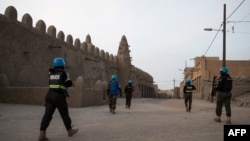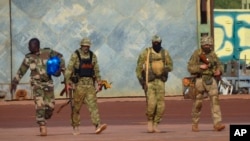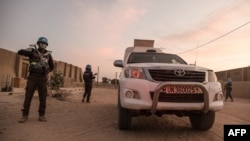This week, the United Nations enters the second phase of drawing down one of its largest peacekeeping missions, after military authorities in Mali announced in June that they wanted the mission out by the end of this year.
“MINUSMA is entering its last chapter,” El-Ghassim Wane, head of mission, told the U.N. Security Council Monday in a video briefing from Mali’s capital, Bamako. MINUSMA stands for the Multidimensional Integrated Stabilization Mission in Mali.
With virtually no notice, Mali’s military authorities, which seized power in a 2021 coup, told the U.N. to pack up its decade-old mission and leave. They have given the organization until the end of this year to repatriate more than 12,000 international peacekeepers and separate from 4,300 civilian staff.
By comparison, when the U.N. drew down its peacekeeping operation in Sudan’s Darfur region, which had half the number of peacekeepers and a third of the civilian staff, it took three years. In Mali, the government has given the U.N. only six months.
The U.N. is doing this against a backdrop of continued instability in Mali, where Islamic State and al-Qaida terrorists battle for control of parts of the country, and Wagner mercenaries from Russia have been hired by the Malian authorities to assist them.
There are concerns that terrorists and armed groups may take advantage of the security vacuum left by departing peacekeepers.
“The government of Mali has very calmly and seriously assessed the withdrawal of MINUSMA and prepared the necessary measures to deal with any possible security vacuum that could be related to this,” Mali Ambassador Issa Konfourou told the council.
The recent military coup in Niger is also complicating the U.N.’s withdrawal from Mali, which is landlocked and has poor roads.
“The situation in Niger is having an impact on our withdrawal plan, which is based on the use of transit zones in Cotonou and Lomé,” Wane said. “It is vital we are able to transport equipment and material through Niger and to its ports for subsequent repatriation to troop-contributing countries and police-contributing countries concerned.”
Wane said the U.N. has just completed its first phase of the drawdown and has closed four small, remote bases and one temporary operating base and returned them to the Malian authorities. More than a thousand peacekeepers have returned to their home countries, and nearly 80 containers of equipment have been shipped out of the country.
Phase Two of the drawdown begins Friday (September 1).
“This phase will be incredibly difficult, indeed,” Wane told council members.
It will entail the closure of six bases in the north, center and northeast of the country. Some camps in the north are in areas controlled by signatory movements to the 2015 peace agreement, and they do not necessarily agree with military authorities over who should control them.
“With the impending withdrawal of MINUSMA, tensions have emerged between the government and one signatory movement, the Coordination des mouvements de l’Azawad [CMA],” U.N. Secretary-General Antonio Guterres warned in a letter last week to the Security Council outlining the mission’s drawdown.
“If not resolved, these tensions could not only complicate the mission’s withdrawal, but also further undermine the cease-fire agreement, with serious implications for the entire peace process.”
Once Phase Two is completed, the mission’s mandate will come to an end. A “liquidation” phase will begin on January 1, 2024, and is expected to continue for about 18 months. During that time, the U.N. will finish shipping out its equipment and material and clean up its environmental footprint.
In addition to the complex logistics and security, the closure of a mission this size will be staggering. In his letter, Guterres said $590 million has been allocated through the end of this year, but a separate budget for the liquidation phase will need General Assembly approval.
Wane said despite the many challenges — MINUSMA has the highest rate of deaths in action among its peacekeepers — he believes “strongly” that the mission has made a tangible contribution to the advancement of peace, security and stability in the country.






